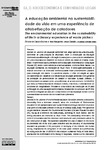A práxis do viver como epistemologiao saber sentido da/na escola como forma de emancipação da condição humana no viver na terra

View/
Use this link to cite
http://hdl.handle.net/2183/22412
Except where otherwise noted, this item's license is described as Atribución-CompartirIgual 3.0 España
Collections
Metadata
Show full item recordTitle
A práxis do viver como epistemologiao saber sentido da/na escola como forma de emancipação da condição humana no viver na terraAlternative Title(s)
The environmental education in the sustainability of life in a literacy experience of waste pickersDate
2017Citation
Ambientalmente Sustentable, 2017, 23-24: 263-279. ISSN: 1887-2417
Abstract
[Resumo] Estudos têm demonstrado a ausência da instituição escolar na trajetória de vida de grupos empobrecidos como o dos catadores de material reciclável. O objetivo do trabalho foi compreender as trajetórias de vida e os processos escolares de estudantes filhos de catadores de material reciclável de uma escola pública do Distrito Federal-DF, localizada no Brasil. Propôs-se o método autoecobiográfico, centrado em oficinas, observação participante e o diário de campo, baseando-se na fenomenologia e na hermenêutica para as análises do processo. Participaram 65 estudantes do 4º ano do ensino fundamental. Pode-se inferir que a sobrevivência e a vivência no Aterro sanitário apontam para a degradação socioambiental e do trabalho, mas assinalam a complexidade do encontro da preca riedade e da criatividade. A família é o território das relações afetivas, onde trabalho e vida se entrelaçam. A escola emerge como território de contradição, mas aponta a existência de elementos de positividade. O pertencimento ao lugar, em que símbolos, relações e histórias se instituem como elementos fundantes para autobiografias e para a biografia coletiva. Destaca-se, portanto, a importânciada escuta desses estudantes pela escola para a constituição de utopias baseadas em autoeducação, autoconsciência e autonomia como um modo de reconectar a educação escolar à vida. [Abstract] Studies have demonstrated the absence of the school institution in the life trajectory of impoverished groups such as recyclable material collectors. The objective of this work was to understand the life trajectories and the school processes of students who are children of recyclable waste pickers of a public school in the Federal District, located in Brazil. It was proposed the autoecobiographic method, centered in workshops, participant observation and feld diary, based on phenomenology and hermeneutics for the analysis of the process. 65 students participated in the 4th year of elementary school. It can be inferred that survival and living in the landfll point to socioenvironmental degradation and work, but they point to the complexity of the encounter of precariousness and creativity. The family is the territory of afective relationships, where work and life intertwine. The school emerges as a territory of contradiction, but points to the existence of elements of positivity. Belonging to the place, where symbols, relationships and stories are established as founding elements for autobiographies and for the collective biography. Therefore, the importance of listening to the students for the formation of utopias based on selfeducation, self-consciousness and autonomy as a way to reconnect school education with life is emphasized.
Keywords
Catadores de material reciclável
Educação ambiental
Ecologia humana
Método autoecobiográfico
Trajetória de vida
Recyclable waste pickers
Environmental education
Human ecology
Autoecobiographic method
Life trajectory
Educação ambiental
Ecologia humana
Método autoecobiográfico
Trajetória de vida
Recyclable waste pickers
Environmental education
Human ecology
Autoecobiographic method
Life trajectory
Rights
Atribución-CompartirIgual 3.0 España
ISSN
1887-2417






